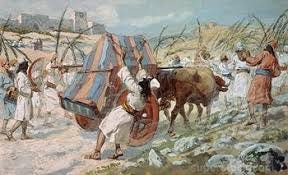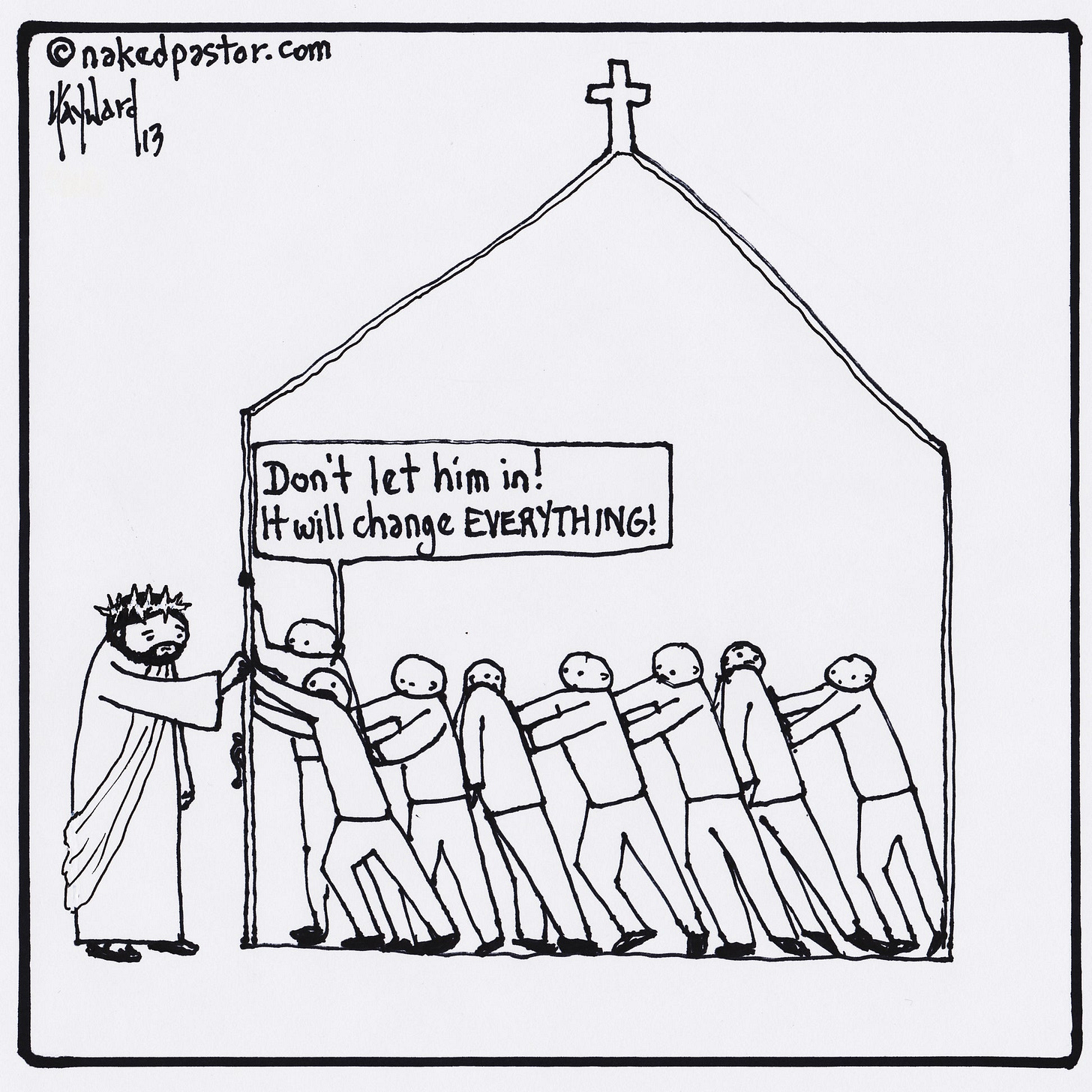7 min 05 sec: app reading time
February 2, 2025
Dear Friend:
The toughest unwiring of my "Christian brain" took place almost 20 years ago, halfway through my life as a Pastor. My reading of the Biblical narrative shifted from textual to catching the nuances behind the depictions of the angry God I grew up fearing. Fear drove half of my religious life with ambivalent feelings of a "loving Jesus" and a demanding "Father" in heaven who kept checking with the "Holy Spirit" to find out if I was following the path or not.
Let’s be honest: some stories in the Bible are tough to handle.
Today, I want to draw your attention to one of them. For me, there’s one Biblical tale that tops them all for its sheer brutality. It’s the story of Uzzah.
Who is Uzzah?
Never heard of Uzzah? You’re not alone.
His story is short — uncomfortably short. There’s no epic showdown, no fiery speech, no burning bush, no lightning, no war, no Exodus miracle, no David and Goliath, and no lasting legacy.
Uzzah doesn’t get the screen time of Moses, David, or Paul. His tale wouldn't be prime time on Netflix if it were scripted into a movie. But his brief appearance in the Bible leaves behind one of the most unsettling moments in all of scripture—actually, beyond shocking, in my view.
If you want to read the seven verses, check out 2 Samuel 6:1–7.
Otherwise, here’s a summary:
King David decided to bring the Ark of the Covenant—the most sacred object in Israel’s history—back to Jerusalem. After a series of unfortunate events, the Ark had been sitting in someone’s backyard for years.
David organized a celebration with music, dancing, and sacrifices.
The Ark was placed on an ox cart, and a couple of men were tasked with "guiding it."
As the procession moved along, the oxen stumbled.
The Ark tilted, and one of the men, Uzzah, instinctively reached out to steady it.
At that moment, God apparently strikes him dead. Can you feel the suspense? What did he do wrong? Would you assist as a church deacon to keep God's sacred Ark standing?
If you’re left thinking, "Seriously? Dead for touching the Ark?" — welcome to the club! For the life of me, I said so many times when I was a kid, "There must be something mysterious behind such an act! God striking someone dead for disobeying an insignificant command? Really?"
Honestly, that story bothered me for most of my adult life. I never preached a sermon on it. I grew up with that notion of religion: "God said so, and that settles it. You don't challenge God on even the little details." I was clear what the "big sins" were, but that one?
The punishment seems wildly disproportionate to the offense. True, God had ordered not to touch the Ark. But, for goodness' sake, the road was bumpy! It was a goodwill act to protect God's sacred space from collapsing.
It feels less like divine justice and more like stepping on a landmine you didn’t know was there. It blows up on your face while trying to do something good!
It makes God seem mean, capricious, a micro-manager with a complex of inferiority, a dictator, and a classic patriarchal, hierarchical god, to put it mildly.
And if we’re being sincere, it feels like one of those stories that raise more questions than it answers.
Wasn’t Uzzah trying to help?
Would it have been better to let the Ark crash to the ground?
Why would God react so severely to what seems like an act of reverence or at least practicality?
Ancient Logic
If you want to take the Bible literally and textually, you are left with a real problem here. These are the kinds of paradoxes that Biblical textualists and people who adhere to the Bible's inerrancy leave scratching their heads, and the skeptics who read them consider ancient irrelevant myths.
This isn’t the image of God many of us are comfortable with.
We prefer the "Good Shepherd" or the "Father" running down the road with arms wide open to welcome the "Prodigal Son." But here, we get something else entirely different.
This is the God who smites on sight.
It’s jarring. Brutal.
It doesn’t compute with the idea that God is a God of love.
In fact, this story doesn’t even make God seem reasonable, let alone loving.
On the other hand, if you can step back and examine this story through the lens of time and culture, it starts to take on a different shape.
Ancient people lived in a world that felt unpredictable and often dangerous. Survival depended on rainfall, good harvests, and protection from invading armies—all things primarily out of their control. They lived in an animist or "spirited environment, " a living landscape where the distinction between the gods and the forces of nature was blurred.
For this ancient community, maintaining divine favor wasn’t just a religious exercise. It was a matter of life and death. Many of these religions were dazzled by nature's supernatural forces. Pantheism was prevalent in many religious practices.
This wasn’t superstition in their eyes. It was empirical logic.
If the crops failed, someone must have done something wrong.
If a person dropped dead suddenly, clearly, they had crossed a line. It was their way of explaining the unexplainable.
So when Uzzah reaches out to touch the Ark and dies, the assumption that God struck him down fits perfectly within that worldview. Obedience was not about logic, choice, or making sense but survival!
To them, this wasn’t just God's overreaction—it was a reminder that the sacred is dangerous and must be handled with extreme care.
In reality, Uzzah might have just had a heart attack. Why knows? It sure would be interesting to see the autopsy results, wouldn’t it?
So, where does that leave us?
Do we chalk this up to ancient superstition and move on, or is there something deeper at play?
I would like you to view this event as a RELATIONAL archetype.
When we strip away the ancient worldview, the cultural context of fear, and strict obedience because the forces of nature and the divine were not clear and step back from the literal reading, we’re left with a different kind of question—what does Uzzah represent?
If we view the story as a relational archetype, Uzzah becomes more than just a guy who dropped dead for disobeying a minor order from God.
He becomes a symbol, an embodiment of what's deeply human.
And suddenly, his story isn’t just about one man’s disobedience — it’s about you and me.
The archetype of this event is that we all carry a little Uzzah in us.
Uzzah represents the part of us that needs to be in control!
That's at least me. The part that can’t stand to see things wobbling, even for a second. I tend to be a fixer, a protector, one who reaches out to steady what feels shaky — convinced that if I don’t intervene, everything will collapse.
There’s a certain comfort in control or at least the illusion of it.
Like Uzzah, we instinctively reach for the things that feel precious, fragile, or too important to leave to chance. It’s almost automatic — when something threatens to slip through our fingers, we tighten our grip.
Uzzah’s impulse isn’t foreign to us because we live it every day. We see it when we try to keep a struggling relationship afloat by managing every conversation as if we alone can hold it together. It shows up when we overextend at work, believing that without our constant attention, everything will unravel. It whispers in our parenting, our friendships, and even our faith — this quiet but persistent voice that tells us if we don’t step in, no one will.
The story of Uzzah reveals the hidden cost of this mindset.
There’s a fine line between "caring" and "controlling," between "trusting" and "grasping" — and Uzzah’s hand on the Ark marks the moment that line was crossed.
The tragedy of Uzzah is not just that he died but that he felt he had to act at all. Instead of trusting God to take care of God's Ark, he felt he had to intervene. He forgot that the Ark was never his to protect. I have to remind myself of such truth when dealing with my kids as a Dad and people as a Pastor. I have to remind myself when experiencing the political climate of our country here in the US.
The Ark represented the very presence of God that, beyond its physicality, never collapses and never ceases to be. When you look at the Ark as the archetype of God's presence you suddenly realize that "obedience" was not the issue, but something much more profound.
How often do we carry burdens that aren’t ours to bear? How frequently do we step into roles we were never meant to fill, reaching out for the sake of stability but finding ourselves overwhelmed by the weight of it all?
Letting go of CONTROL and “letting God” is, for many of us, the most formidable challenge of life!
Uzzah’s reflex to reach for the Ark is familiar because it’s the same reflex we experience when life starts to feel unstable. We reach for control — of outcomes, people, and circumstances — convinced that our intervention is not only helpful but necessary.
Uzzah’s death is tragic, but it mirrors a quieter tragedy that plays out in our own lives when we attempt to control instead of trusting God.
Maybe Uzzah’s story isn’t about punishment at all — maybe it’s about trust and letting go!
What if the Ark wasn’t as fragile as Uzzah believed?
What if, in letting it sway, he would have discovered that the presence of God can hold itself up without human hands?
The sacred doesn’t need steadying — and often, neither do the things we cling to the most.
The story leaves us with a quiet but pressing question: Where are you reaching to control the Ark in your life? Are your kids, sons, or daughters struggling with something you are not being called to carry? Is your fragile marriage? Your retirement? Your finances? Your reputation?
In my denomination as a Seventh-day Adventist, what if the INSTITUTION and its leaders are desperately trying to hold it together while churches empty out and finances become increasingly troubled? Did God call you to “hold it together”? Or is the “wobbly” moment God’s chance to show up while you trust God and “let go” of control?
Maybe the point of the ancient story isn’t to "hold it together" at any cost by control or personal effort, which causes anxiety and stress driven by fear of personal defeat, but trust that God will stay with you through the bumps in the road.
What are you holding onto that was never yours to carry in the first place?
With you on your journey,
Pastor Harold






